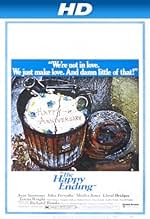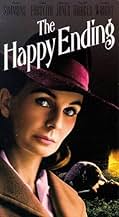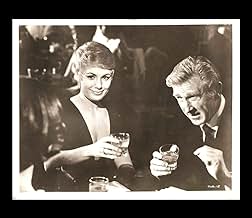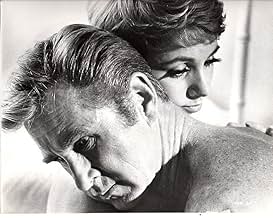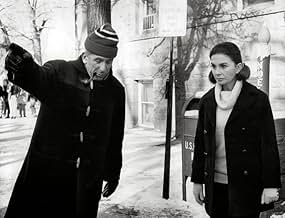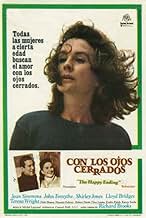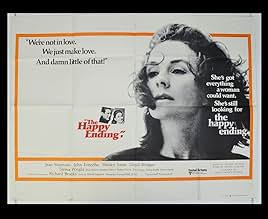CALIFICACIÓN DE IMDb
6.3/10
1.4 k
TU CALIFICACIÓN
Agrega una trama en tu idiomaA middle-aged woman walks out on her husband and family in an desperate attempt to find herself.A middle-aged woman walks out on her husband and family in an desperate attempt to find herself.A middle-aged woman walks out on her husband and family in an desperate attempt to find herself.
- Dirección
- Guionista
- Elenco
- Nominado a 2 premios Óscar
- 5 nominaciones en total
Bobby Darin
- Franco
- (as Robert Darin)
William O'Connell
- Minister
- (as Wm. O'Connell)
Ingrid Bergman
- Self - Actress in 'Casablanca'
- (material de archivo)
- (sin créditos)
Humphrey Bogart
- Self - actor in 'Casablanca'
- (material de archivo)
- (sin créditos)
- Dirección
- Guionista
- Todo el elenco y el equipo
- Producción, taquilla y más en IMDbPro
Opiniones destacadas
Take a good look at the film credits of Jean Simmons especially during the Fifties and you'll find that woman has been in some of the best movies ever made. Yet nary an Oscar nomination for her until The Happy Ending and she lost that year to Maggie Smith for The Prime of Miss Jean Brodie.
A great example of this would be Elmer Gantry where Jean did not get a nomination unlike the Oscars won by her co-stars Burt Lancaster and Shirley Jones. Yet she did walk off with the director Richard Brooks who became her second husband. It was Brooks who wrote and directed The Happy Ending about a woman tipping into forty something who still has a whole lot of silly romantic notions.
Jean and husband John Forsythe are approaching their twentieth anniversary together and she feels in a rut. So she indulges in all kinds of bad behavior, runs up huge charge account bills, starts drinking like a fish, runs away to a vacation in the Bahamas where an old college pal, Shirley Jones, takes her in.
Elia Kazan in the same year 1969 did a similar film from the man's point of view, The Arrangement which starred Kirk Douglas. The Happy Ending however is far better and it might really have been interesting if Deborah Kerr in that film had gone off the edge the way Jean does here.
In The Happy Ending Jean loves watching Casablanca and I find it fascinating that she picks that as a great romantic film. If memory serves that's the one where Humphrey Bogart and Ingrid Bergman give up their personal happiness for what they conceive as the greater good.
I do like Shirley Jones in this film as the old college sorority chum who eschewed marriage to just being a permanent 'other' woman. She's had three so far and she's accompanying a fourth to Nassau in the person of Lloyd Bridges. It's fascinating that only Richard Brooks cast Shirley in parts where she wasn't a goody goody and she won great acclaim and an Oscar for being prostitute in Elmer Gantry.
Jean's partial solution to her problems in the end is a very typical feminist one which I will not reveal. As to whether she's damaged her relationship with Forsythe beyond repair, that's anyone's guess.
You will also like Teresa Wright as Jean's mother, Bobby Darin as an about to go over the hill gigolo, and Tina Louise as the neighbor who's ready to take Jean's place with Forsythe any time.
Besides Jean Simmons nomination, The Happy Ending also was nominated for Michel LeGrand's classic song, What Are You Doing The Rest Of Your Life, a question Jean is struggling to answer all the film long.
The Happy Ending is a good and mature film that could only have been made once the sacred Code was abandoned. Too bad though that it could not have resulted in an Oscar for its star.
A great example of this would be Elmer Gantry where Jean did not get a nomination unlike the Oscars won by her co-stars Burt Lancaster and Shirley Jones. Yet she did walk off with the director Richard Brooks who became her second husband. It was Brooks who wrote and directed The Happy Ending about a woman tipping into forty something who still has a whole lot of silly romantic notions.
Jean and husband John Forsythe are approaching their twentieth anniversary together and she feels in a rut. So she indulges in all kinds of bad behavior, runs up huge charge account bills, starts drinking like a fish, runs away to a vacation in the Bahamas where an old college pal, Shirley Jones, takes her in.
Elia Kazan in the same year 1969 did a similar film from the man's point of view, The Arrangement which starred Kirk Douglas. The Happy Ending however is far better and it might really have been interesting if Deborah Kerr in that film had gone off the edge the way Jean does here.
In The Happy Ending Jean loves watching Casablanca and I find it fascinating that she picks that as a great romantic film. If memory serves that's the one where Humphrey Bogart and Ingrid Bergman give up their personal happiness for what they conceive as the greater good.
I do like Shirley Jones in this film as the old college sorority chum who eschewed marriage to just being a permanent 'other' woman. She's had three so far and she's accompanying a fourth to Nassau in the person of Lloyd Bridges. It's fascinating that only Richard Brooks cast Shirley in parts where she wasn't a goody goody and she won great acclaim and an Oscar for being prostitute in Elmer Gantry.
Jean's partial solution to her problems in the end is a very typical feminist one which I will not reveal. As to whether she's damaged her relationship with Forsythe beyond repair, that's anyone's guess.
You will also like Teresa Wright as Jean's mother, Bobby Darin as an about to go over the hill gigolo, and Tina Louise as the neighbor who's ready to take Jean's place with Forsythe any time.
Besides Jean Simmons nomination, The Happy Ending also was nominated for Michel LeGrand's classic song, What Are You Doing The Rest Of Your Life, a question Jean is struggling to answer all the film long.
The Happy Ending is a good and mature film that could only have been made once the sacred Code was abandoned. Too bad though that it could not have resulted in an Oscar for its star.
Jean Simmons makes this compelling viewing. The back-story of the film is that director Richard Brooks, Simmons husband at the time, was concerned and aware of Jean's alcoholism and designed the picture not only as a showcase for her prestigious talent, rewarded with an Oscar nomination, but hopefully a wakeup call for her. It didn't work immediately and eventually helped destroy their marriage but she was able to eventually conquer her demons and live sober until the end of her life. The film itself is a scatter-shot affair what with its frequent flashbacks and fragmented nature but does have a beautiful score and excepting Bobby Darin very good supporting work. Shirley Jones is notable in particular in the smallish role of an old college chum of Jean's. The ending is beautifully done, simple and true.
When I first saw THE HAPPY ENDING, back in 1970, I was blown over by the film's sensitive portrayal of an unhappy housewife trying to decide what to do with her life. I took family and friends to see it and most people liked the film, finding it unusually frank as a portrayal of a failed marriage. I still find THE HAPPY ENDING very good. It is aesthetically rooted in the late sixties but that does not diminish its essential value. The all-star cast is excellent (Jean Simmons, John Forsythe, Teresa Wright, Nanette Fabray, Shirley Jones, Bobby Darin, Lloyd Bridges, Tina Louise) and Jean Simmons might have shared the Oscar with Maggie Smith that year. Both actresses deserved to receive acting honors for their respective roles. I love the jazzy music score by Michel Legrand; Marilyn & Alan Bergman's beautiful song-theme for the film is a perennial favorite of mine as far as romantic songs are concerned. All in all, I will always have a special place in my heart for THE HAPPY ENDING.
This is a serious work about a bored wife. Some of it seems a little dated. Seen in 1999, the development of the story is quite predictable, although I figure it was less so 30 years ago. Didn't move me much. All in all, respectable stuff.
Well, The Happy Ending is a textbook example of a late sixties movie by an established director. In as much as it is well intended, partly even "hip" but still missed its audience by a mile. How is that? The late sixties were a bad time for Hollywood filmmakers and producers. The box office numbers dropped and the pressure to have a hit increased. The well-known directors of the thirties, forties and fifties more and more lost contact with the moviegoers. One can almost say that Hollywood made films for a past generation. Looking at the big winners and losers tells you that a new style was in demand. This of course happened world wide.
It is interesting to notice that many of the best directors still had a hit in the early sixties but finished with a big flop in the end of the same decade! The bigger the director, the greater the downfall, I'm tempted to say.
And the failure was not only that not enough people went to see the films. In most cases the public was right and the film was just not good. The producers put pressure on the filmmakers to employ more modern stories and story telling devices and fresh faces. The established directors were not used to this cold wind blowing into their faces, and had little ideas what the public wanted to have changed. Everyone tried something but no one really hit the nail on the head. Let's have a look at some of them. Hitchcock started the sixties with Psycho and ended with Topaz. Billy Wilder started with The Apartment and ended the decade with The Private Life of Sherlock Holmes. Otto Preminger had a big hit with Exodus in 1960 but his last film in the sixties, Skidoo, did so badly with critics and public that few people ever saw it. Frank Capra realized the changes and stopped film-making in 1961.
Fred Zinnemann began the sixties with The Sundowners, had a big Success with A Man of all Seasons, but couldn't get the funding for another project until The Day of the Jackal (1973) since box office in general was going down and producers were scared. Most of the named directors managed to get a foot on the ground again in the seventies and end their career with a respectable picture.
Some managed to have hits till to the middle of the sixties like Robert Wise with Sound of Music, but even that did not help to prevent him from having a bomb with Star!. Richard Brooks had a similar experience with In Cold Blood, that was followed by The Happy Ending. What was going on?
I think the fact that the general interest of the audience changed dramatically throughout the sixties almost completely eluded the Hollywood producers and filmmakers. And when they finally notices and tried to join the new wave it turned out that they have been too old to understand what was going on or that they thought it is enough to get some new faces into their films to appeal to a young and critical audience. Howard Hawks for example tried to jump on the wagon by simply recycling one of his earliest successes The Crowd Roars with new and unknown (and in-experienced) actors but did basically the same thing in Red Line 7000. It was a terrible mistake.
The dinosaur directors only managed to make money by concentrating again on what they did best and Hawks did El Dorado and had a decent swan song with Rio Lobo. Hitchcock tried to join in on the big business with spy movies that made so much money in the form of James Bond or his little brother Harry Palmer. Hitch tried it with Torn Curtain and with Topaz. To be on the safe side he even took a bestseller from Leon Uris (Topaz). The stories as they were told were mainly old fashioned. He had same new ideas in them but the general approach was like the espionage films he did in the thirties. He got out of this loop by going back to the kind of thrillers he was famous for and returned to the screen with Frenzy and had a good final movie with The Family Plot.
The studio system that already started to die with the advent of TV collapsed for good. New directors like Bogdanovich, Scorsese, Coppola and so on began to work for the big studios only after they started for small budget producers, mainly Roger Corman. Others like Dennis Hopper or John Cassavetes had long worked as an actor before being able to direct.
But what exactly is wrong with The Happy Ending? The story line is about a couple after they married. It tries to have a realistic look about problems arising from delusions almost everyone has about "happy ends". Jean Simmons still looks very young and attractive and John Forsythe does his very best. For one thing the constant music playing that lies like a veil over every scene that is really annoying. I'm a big fan of Michel Legrand but this film suffers from the soundtrack he wrote. (Two for the Road is another film that is, theme and music, very similar to The Happy Ending. This time Henry Mancini's music drowns every serious feeling.)
The story drags on and on, we see many episodes that amount to very little. The dialog is dull and everyone moves in upper class levels. The worst thing about The Happy Ending is that everything and everyone seems so boring. At the end you do not care what Jean Simmons decides. You are only glad the movie is over.
It is interesting to notice that many of the best directors still had a hit in the early sixties but finished with a big flop in the end of the same decade! The bigger the director, the greater the downfall, I'm tempted to say.
And the failure was not only that not enough people went to see the films. In most cases the public was right and the film was just not good. The producers put pressure on the filmmakers to employ more modern stories and story telling devices and fresh faces. The established directors were not used to this cold wind blowing into their faces, and had little ideas what the public wanted to have changed. Everyone tried something but no one really hit the nail on the head. Let's have a look at some of them. Hitchcock started the sixties with Psycho and ended with Topaz. Billy Wilder started with The Apartment and ended the decade with The Private Life of Sherlock Holmes. Otto Preminger had a big hit with Exodus in 1960 but his last film in the sixties, Skidoo, did so badly with critics and public that few people ever saw it. Frank Capra realized the changes and stopped film-making in 1961.
Fred Zinnemann began the sixties with The Sundowners, had a big Success with A Man of all Seasons, but couldn't get the funding for another project until The Day of the Jackal (1973) since box office in general was going down and producers were scared. Most of the named directors managed to get a foot on the ground again in the seventies and end their career with a respectable picture.
Some managed to have hits till to the middle of the sixties like Robert Wise with Sound of Music, but even that did not help to prevent him from having a bomb with Star!. Richard Brooks had a similar experience with In Cold Blood, that was followed by The Happy Ending. What was going on?
I think the fact that the general interest of the audience changed dramatically throughout the sixties almost completely eluded the Hollywood producers and filmmakers. And when they finally notices and tried to join the new wave it turned out that they have been too old to understand what was going on or that they thought it is enough to get some new faces into their films to appeal to a young and critical audience. Howard Hawks for example tried to jump on the wagon by simply recycling one of his earliest successes The Crowd Roars with new and unknown (and in-experienced) actors but did basically the same thing in Red Line 7000. It was a terrible mistake.
The dinosaur directors only managed to make money by concentrating again on what they did best and Hawks did El Dorado and had a decent swan song with Rio Lobo. Hitchcock tried to join in on the big business with spy movies that made so much money in the form of James Bond or his little brother Harry Palmer. Hitch tried it with Torn Curtain and with Topaz. To be on the safe side he even took a bestseller from Leon Uris (Topaz). The stories as they were told were mainly old fashioned. He had same new ideas in them but the general approach was like the espionage films he did in the thirties. He got out of this loop by going back to the kind of thrillers he was famous for and returned to the screen with Frenzy and had a good final movie with The Family Plot.
The studio system that already started to die with the advent of TV collapsed for good. New directors like Bogdanovich, Scorsese, Coppola and so on began to work for the big studios only after they started for small budget producers, mainly Roger Corman. Others like Dennis Hopper or John Cassavetes had long worked as an actor before being able to direct.
But what exactly is wrong with The Happy Ending? The story line is about a couple after they married. It tries to have a realistic look about problems arising from delusions almost everyone has about "happy ends". Jean Simmons still looks very young and attractive and John Forsythe does his very best. For one thing the constant music playing that lies like a veil over every scene that is really annoying. I'm a big fan of Michel Legrand but this film suffers from the soundtrack he wrote. (Two for the Road is another film that is, theme and music, very similar to The Happy Ending. This time Henry Mancini's music drowns every serious feeling.)
The story drags on and on, we see many episodes that amount to very little. The dialog is dull and everyone moves in upper class levels. The worst thing about The Happy Ending is that everything and everyone seems so boring. At the end you do not care what Jean Simmons decides. You are only glad the movie is over.
¿Sabías que…?
- TriviaJean Simmons has said that the film was a very painful one for her, as she herself was having problems with alcohol at the time. According to Simmons, her then-husband Richard Brooks wrote the film especially for and about her: he hoped that playing Mary might help her to more clearly see her own problems.
- ErroresDuring the opening-credit sequence, many late-model 1960's cars are seen in flashback scenes supposedly set 15 years earlier.
- Citas
[last lines]
Mary Wilson: If... if right now we were not married, if you were free, would you marry me again ?
- Versiones alternativasThe film was originally submitted to the MPAA for an R rating. After United Artists found Richard Brooks' intended cut too depressing, the studio forced to cut the film into a "moviegoer friendly" cut that was rated M. Brooks' R-rated cut was released in other countries as intended but was not released in the United States until 2016.
- ConexionesFeatures Susan Lenox (Her Fall and Rise) (1931)
- Bandas sonorasWhat Are You Doing the Rest of Your Life?
Music by Michel Legrand
Lyrics by Alan Bergman and Marilyn Bergman
Sung by Michael Dees
Selecciones populares
Inicia sesión para calificar y agrega a la lista de videos para obtener recomendaciones personalizadas
- How long is The Happy Ending?Con tecnología de Alexa
Detalles
- Tiempo de ejecución
- 1h 57min(117 min)
- Relación de aspecto
- 2.35 : 1
Contribuir a esta página
Sugiere una edición o agrega el contenido que falta


